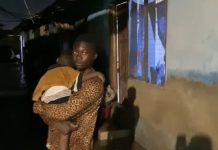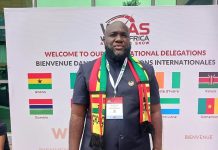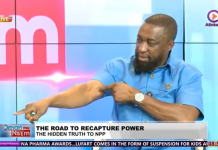“Mummy, why is my skin colour different from the other children? Son, that is how God created you.
Mummy, then tell Jesus I don’t want this skin colour, I want to be like the other children. Please tell Jesus to change my skin colour”
The above is an interaction between a mother and his son who is just six years old. The boy is an albino and does not understand what that condition means. The mother on the other hand seems not to know how best to explain the condition to his son.
She tells Regina Asamoah in an exclusive interview that, she always has to answer questions and provide explanation to the boy which is worrying and doubles her fears as his son ages.
The interview is under the “Mobilizing Media to Fighting COVID-19” project being implemented by the Journalists for Human Rights (JHR) in collaboration with the Ghana Journalists Association (GJA).
Madam Mavis Mensah is a single mother who lives at Roman Down, a suburb of Ashaiman in the Greater Accra Region. Some six years ago, just like every expectant pregnant woman, Mavis was yearning for that moment where after delivery, her baby would be brought to her in all joy.

But then, that joy diminished some hours after delivery. Mavis recounting what happened that fateful day said, “I heard the doctors and nurses murmuring. What is this, a nurse asked? Another asked, how come she gave birth to this? I remembered vividly, how the health professionals were all coming to my ward just to catch a glimpse of what I had given birth to? It was at this point that I heard a nurse describe my son as ‘ofri’ meaning Albino.
It was emotionally draining and psychologically torturing. I hated my baby just then because I became a public ridicule for giving birth to him. The attitude of the health professionals was nothing good to write home about as they gave me a negative impression about my baby. At that moment, I knew nothing about Albinism.
WHAT IS Albinism
Albinism is a rare, non-contagious, genetically inherited difference present at birth. In almost all types of albinism, both parents must carry the gene for it to be passed on, even if they do not have albinism themselves. The condition is found in both sexes regardless of ethnicity and in all countries of the world.

Albinism results in a lack of pigmentation (melanin) in the hair, skin and eyes, causing vulnerability to the sun and bright light. As a result, almost all people with albinism are visually impaired and are prone to developing skin cancer. There is no cure for the absence of melanin that is central to albinism.
Hatred turn Love
Madam Mavis Mensah who was teary recounted how she reluctantly gave her son breast milk because she did not love the baby based on her experience at the Hospital where she delivered. However, after weeks with her new baby at her parents’ home, she witnessed how her extended family cared for the baby. The baby was loved and adored by her relatives. They would come for him and would not want to return him because even as a baby, he was adorable. I questioned myself, why I hated my only child when everyone in the family loved him.

According to her, that was the turning point. “I began researching into the condition of my son. I started asking questions about albinism. Started making contacts to persons with the same condition. After a deeper understanding into what Albinism entails, I realized it was not my son’s fault. It was just a medical condition and it can happen to anyone.”
The six-year journey
Madam Mavis Mensah’s son, Nathaniel is six years now. He has grown into a healthy and energetic young boy. For her, the journey has not been an easy one as she shares highlights;
Access to Health Care
There were days, I would return from postnatal care very depressed, because, some mothers would not even want their babies to come close to my son. Even some of the healthcare givers were distant when it is my son’s turn to be attended to. I don’t blame them, this is because, Albinism is profoundly misunderstood, socially and medically.
But for my determination to get the best healthcare for my son, he would not have grown into a healthy boy. Also, the health challenge where he lacks Melanin makes him highly vulnerable to developing skin cancer.
As established, skin cancer is highly preventable when persons with albinism enjoy their right to health. This includes access to regular health checks, sunscreen, sunglasses and sun-protective clothing. In a significant number of countries, these life-saving means are unavailable or inaccessible to them and Ghana is of no exception.

Madam Mavis tells me how expensive it is to purchase the required pomade for his son’s skin so as to prevent skin- cancer. For her, a friend in the Czech Republic has been donating some to her anytime she comes to Ghana but due to the COVID-19 pandemic, she has not been able to receive any for over a year.
Her fears are that, her son’s skin will be damaged if she doesn’t get money to get the required pomade for him.
Access to Education
Six-year-old Nathaniel, is a KG-2 pupil at a private school located some few meters away from his home. Speaking in an interview, Nathaniel says he loves to go to school and his favourite subjects are Numbers and Words. He freely, recited the Alphabets A-Z with no aid and similarly, he recited the numbers, 1-100. Full of excitement, he said “I love to go to school because I want to learn.” This was in response to the question, if he loved going to school.
Nathaniel’s mother although happy that his son loves to go to school, her fear is that her child would not be able to go through the education system just like other children. According to her, she is fulfilling her duty as stated in the Ghana’s Disability Act, 2006, Article 16, which enshrines a parent, guardian of a child with disability of school going age to enroll the child in a school. However, the State is in contravention of the Disability, Act which charges the Government to establish special schools for persons with disability who by reason of their disability cannot be enrolled in formal schools. In this regard, she says much is desired from Government.

Sharing her fears, she said, there are days he comes back from school and tells me he didn’t see anything on the board from where he sits so, he had to move very close to the board before seeing. I told him it was just a temporary situation but, in my heart, I know that was gradually going to be his fate. I spoke with his teachers and he was relocated to where he could see clearly.
For about a week, he would always complaint about one of their teaching assistants. From the complaints, I could sense, that teaching assistant did not like my son. I visited the school to file a complaint and upon investigations, it was confirmed that the teaching assistant claims, she is distant towards my son because she does not want to give birth to an albino in future. I broke down in tears. Albinism is shrouded in myth, erroneous belief, longstanding stigma and partly emanating from manifestation of beliefs in witchcraft
I picked him up from school one fateful day and he asked me, Mummy, why is my skin colour different from the other children? I was not expecting such a question, so I quickly said, Son, that is how God created you. Then he said, Mummy, then tell Jesus I don’t want this skin colour, I want to be like the other children. Please tell Jesus to change my skin colour. Upon further interrogation, I realized that in school, his teachers did not allow him to fully play just like the other children because of how delicate his skin is. So, he felt his skin colour was blocking him from enjoying his childhood days, hence, the need for a change in skin colour.
According to the single mother, children with disabilities face a lot of discrimination in schools which leads to most of these children dropping out of school. My passionate appeal to government is that teachers must be sensitized on the forms of disability that exists so that they can at least help in the education of children with disabilities.

One of my greatest fear is how my son can enjoy his right to education in a country where much attention is not paid to children with albinism. He is in KG2, at this stage, the teachers are patient enough but what happens as he grows. I have been speaking with other parents and there seems to be no light at the end of the tunnel.
Speaking in an interview with the Public Relations Officer, Cassandra Twum Ampofo explained that the Government of Ghana has established the Special Education Division (SPED) within the Ghana Education Service (GES) with a vision to increase access to quality education and training of learners and young people with disabilities and special educational needs in an inclusive school environment leading to employable skills for economic and independent living.
As the Division work to achieve this vision, it is an undeniable fact that children with Special Needs continue to suffer discrimination within the education system.
Albinism and Human rights
People with albinism face multiple forms of discrimination worldwide.
The physical appearance of persons with albinism is often the object of erroneous beliefs and myths influenced by superstition which foster their marginalization and social exclusion. This leads to various forms of stigma and discrimination.
Some social development experts have said that in the space of development measures, persons with albinism have been and are among those “left furthest behind”. Therefore, they ought to be targeted for human rights interventions in the manner envisioned by the Sustainable Development Goals.
The Convention on the Rights of the Child, Article 23 states that “Every Child with a disability should enjoy the best possible life in society. Governments should remove all obstacles for children with disabilities to become independent and to participate actively in the community”.

Over the years, hundreds of ritual attacks against persons with albinism, particularly children, have been reported in many African countries including Ghana without any actions from governments to bring perpetrators to book. Investigative Journalist, Anas Aremeyaw Anas, in one of his exposés on Albinos in Tanzania revealed the human rights violations of persons with albinism especially Children. Over the years, hundreds of ritual attacks against persons with albinism, particularly children, have been reported in many African countries including Ghana without any sustainable actions from Governments to bring perpetrators to book.
Discrimination against Albinos in Ghana are underlain by religious and cultural beliefs. Some communities and families consider it a misfortune to give birth to Albinos and hence, attempts are made to either kill them at birth or banish them from the community.
The story of this 6-yr-old albino boy means, Ghana has a long way to go in ensuring that children with any form of disability enjoy their human rights to the fullest.
Impact of COVID-19
The Single Mother explained the difficulty she had to go through to take care of her son in the peak period of the COVID-19 pandemic in the country.
The President Nana Addo Dankwa Akufo-Addo on March 28, 2020 announced a partial lockdown for Greater Accra and Greater Kumasi Regions. The lockdown effective March 30, 2021 was to help curb the spread of the Covid-19 virus.
Almost all activities came to a halt and the harsh impact on COVID-19 on economic activities became evident. Mavis Mensah, was engaged in menial jobs supported by family members to care for her son. But due to the harsh impact of COVID-19 she had to quit those jobs because of the lockdown.
Also, due to the Air and Land Border closure imposed by the Ghanaian Government, her friend whom she was expecting to come from Czech Republic to Ghana in 2020, so she can get the required pomade for her son’s skin could not come. Now, she has no hope on how to get the pomade for her son if the one she is using gets finish.
Although, the country has lifted some of the COVID-19 restrictions and encouraged the adherence to the Safety Protocols, economic activities have still not been stable. Madam Mavis Mensah says she is unable to get any employment so she can adequately support her son.
A mother’s appeal
Madam Mavis Mensah is appealing to the Government of Ghana to initiate, through the Ministry of Gender, Children and Social Protection, a social intervention programme targeted at Mothers with child/ children with disability. According to her, most mothers with such children are unable to gain any employment or even venture into high profitmaking business. All their life is to care for the child. In most instances, these children are abandoned by their fathers. For her, a targeted policy will ease the burden on these women.
Ghana| Atinkaonline.com |Regina Asamoah |[email protected]


























